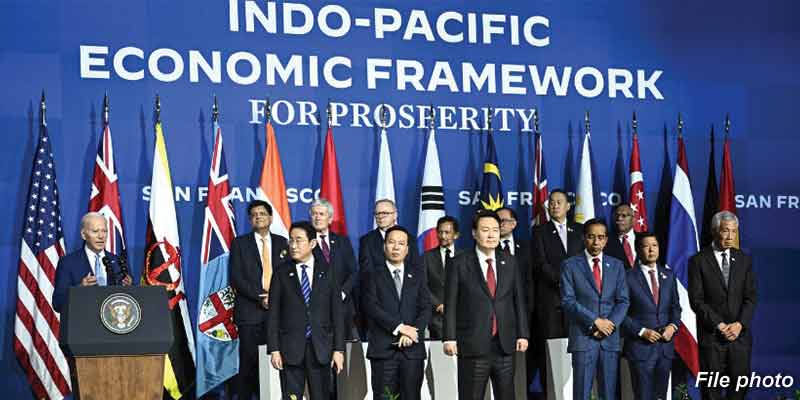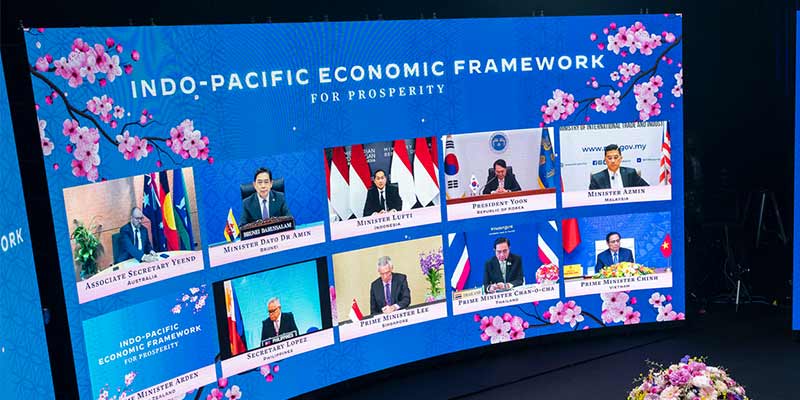- India
- Aug 01
IPEF elects India as vice-chair of Supply Chain Council
India has been elected as vice-chair of the Supply Chain Council of Indo-Pacific Economic Framework (IPEF).
The 14 IPEF partners have established three bodies under the IPEF’s agreement on supply chain resilience. The pact came into force in February this year.
Indo-Pacific Economic Framework (IPEF)
• The IPEF was launched jointly by the US and other partner countries of the Indo-Pacific region on May 23, 2022 in Tokyo.
• It seeks to strengthen economic partnership among participating countries with the objective of enhancing resilience, sustainability, inclusiveness, economic growth, fairness and competitiveness in the Indo-Pacific region.
• The IPEF is not a traditional free trade agreement and the fundamental view behind it is that the new landscape and the new challenges need a new approach.
• The 14 members of the IPEF are — Australia, Brunei, Fiji, India, Indonesia, Japan, South Korea, Malaysia, New Zealand, Philippines, Singapore, Thailand, Vietnam and the US.
• Together, these countries represent 40 per cent of world GDP.
• The IPEF seeks to fuel economic prosperity and investment, promote sustainable and inclusive economic growth, and benefit workers and consumers across the region.
Highlights of IPEF:
• These countries share a commitment to a free, open, fair, inclusive, interconnected, resilient, secure, and prosperous Indo-Pacific region that has the potential to achieve sustainable and inclusive economic growth.
• As the economic policy interests in the region are intertwined, and deepening economic engagement among partners is crucial for continued growth, peace, and prosperity.
• The pandemic has emphasized the importance of strengthening economic competitiveness and cooperation and securing critical supply chains, while stimulating job growth and improving economic opportunities.
• Through this initiative, the countries aim to contribute to cooperation, stability, prosperity, development, and peace within the region.
• India is committed to a free, open and inclusive Indo Pacific Region and would work towards deepening economic cooperation among partners for growth and prosperity of the region. The framework is inclusive and allows flexibility to partner countries to associate with pillars based on their respective priorities.
Main pillars of the framework:
1) Trade: The partners seek to build high-standard, inclusive, free and fair trade commitments and develop new and creative approaches in trade and technology policy that advance a broad set of objectives that fuels economic activity and investment, promotes sustainable and inclusive economic growth, and benefits workers and consumers. The efforts include, but are not limited to, cooperation in the digital economy.
2) Supply Chains: The countries are committed to improving transparency, diversity, security and sustainability in our supply chains to make them more resilient and well-integrated. It seeks to:
i) Coordinate crisis response measures.
ii) Expand cooperation to better prepare for and mitigate the effects of disruptions to better ensure business continuity.
iii) Improve logistical efficiency and support.
iv) Ensure access to key raw and processed materials, semiconductors, critical minerals, and clean energy technology.
3) Clean Economy: IPEF partners are aiming to advance cooperation on research, development, commercialisation, availability, accessibility, and deployment of clean energy and climate-friendly technologies, and facilitate investment towards climate-related projects in the region. It includes measures that span a wide variety of climate and energy issues with the aim to urgently reduce greenhouse gas emissions and build climate resilience while ensuring a just transition. Further, interested IPEF partners are introducing a regional hydrogen initiative to encourage widespread deployment of renewable and low-carbon hydrogen and its derivatives in the region.
4) Fair Economy: IPEF partners aim to strengthen implementation of effective anti-corruption and tax measures to boost commerce, trade, and investment among IPEF economies. These will include provisions on the exchange of tax information, criminalisation of bribery in accordance with UN standards, and effective implementation of beneficial ownership recommendations to strengthen our efforts to crack down on corruption.
• India joined Pillars 2,3 and 4 of IPEF, while it has maintained an observer status in Pillar 1.
Supply Chain Agreement
• The inaugural virtual meetings of the Supply Chain Council (SCC), Crisis Response Network (CRN), and Labor Rights Advisory Board (LRAB) marked a major step forward for cooperation among partner countries for strengthening supply chain resilience in the region.
• Through these inaugural meetings, the IPEF partners reaffirmed their commitments and collective resolve to facilitate closer cooperation to strengthen the resilience and competitiveness of critical supply chains and better prepare for and respond to supply chain disruptions that pose a risk to economic prosperity while strengthening labor rights.
• Pursuant to the Supply Chain Agreement, the IPEF partners established three supply chain bodies:
i) Supply Chain Council to pursue targeted, action-oriented work to strengthen the supply chains for those sectors and goods most critical to national security, public health, and economic well-being.
ii) Crisis Response Network to provide a forum for collective emergency response to exigent or imminent disruptions.
iii) Labor Rights Advisory Board that brings together workers, employers, and governments at the same table to strengthen labor rights and workforce development across regional supply chains.
• The Supply Chain Council and Crisis Response Network comprises senior government officials, while the Labor Rights Advisory Board includes senior government officials and representatives from the worker and employer organisations credentialed at the most recent International Labor Conference, from each of the 14 IPEF partners.
• The inaugural virtual meetings of the Supply Chain Council (SCC), Crisis Response Network (CRN), and Labor Rights Advisory Board (LRAB) marked a step forward for cooperation among partner countries for strengthening supply chain resilience in the region.
• Each of the three supply chain bodies elected a chair and vice chair, which will serve for a term of two years.
• For the Supply Chain Council, the Council members elected the United States as chair and India as vice chair.
• For the Crisis Response Network, the Network members elected South Korea as chair and Japan as vice chair.
• For the Labor Rights Advisory Board, the United States was elected to serve as chair and Fiji as the vice chair.
Manorama Yearbook app is now available on Google Play Store and iOS App Store


